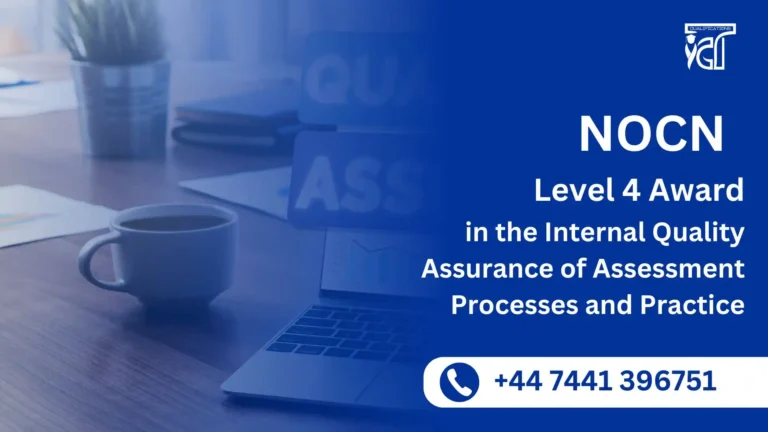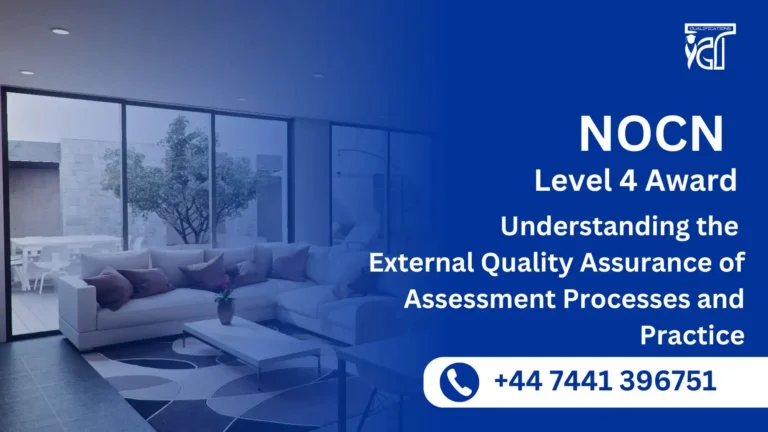Fire safety is crucial for maintaining a secure environment in any workplace. The Qualsafe Level 2 Award in Fire Safety (RQF) is an essential qualification for individuals and organizations committed to ensuring fire safety standards and compliance. This Ofqual-regulated qualification provides learners with the knowledge and practical skills to manage fire risks effectively and respond to emergencies in the workplace.
The Qualsafe Level 2 Award in Fire Safety (RQF) is an accredited qualification designed to provide a comprehensive understanding of fire safety procedures and risk management. This course is perfect for those responsible for fire safety in their workplace, such as fire wardens, managers, supervisors, and employees who need to enhance their understanding of fire prevention and emergency response.
As an Ofqual-regulated qualification, the course ensures that learners meet national standards, offering a globally recognized certification that enhances both career prospects and workplace safety. The course is entirely assignment-based, allowing learners to study at their own pace and complete the course requirements without the pressure of exams.
The Qualsafe Level 2 Award in Fire Safety (RQF) is a must-have qualification for anyone looking to improve fire safety knowledge in the workplace. With its Ofqual-regulated status, flexible learning approach, and industry recognition, this course ensures you have the skills and knowledge to handle fire risks, prevent accidents, and respond effectively in emergencies. Enhance your career prospects, improve workplace safety, and ensure compliance with fire safety regulations by enrolling in the Qualsafe Level 2 Award in Fire Safety (RQF) today.
Qualsafe Level 2 Award in Fire Safety (RQF)
The Qualsafe Level 2 Award in Fire Safety (RQF) has 1 unit that Learners are required to complete in order to achieve the qualification. Qualification unit 1 has 6 GLH.
| Sr# | Unit Title |
|---|---|
| 1 | Understand the hazards and risks associated with fire in the workplace |
| 2 | Understand how fire risk is controlled in the workplace |
| 3 | Understand the principles and practice of fire safety management at work |
| 4 | Understand the role of the nominated fire warden |
GLH (Guided Learning Hours) and TQT (Total Qualification Time) are terms commonly used in vocational qualifications to help define the amount of time a learner is expected to spend on their studies.
1. GLH (Guided Learning Hours)
GLH refers to the number of hours a learner spends being directly taught, supervised, or supported during their course. This includes the time spent in activities such as:
- Classroom instruction
- Practical workshops
- One-on-one tutoring or mentoring sessions
- Online learning sessions with tutor support
In other words, GLH represents the time that learners are actively engaged with their instructors or learning activities.
2. TQT (Total Qualification Time)
TQT represents the total amount of time a learner is expected to invest in completing a qualification, including:
- GLH (Guided Learning Hours): Time spent on direct learning, as explained above.
- Self-Directed Learning: This includes time spent on independent study, research, assignment completion, preparation for exams, and any other work the learner does outside of direct teaching hours.
TQT is a broader measure that includes all the time required to achieve the qualification. It helps learners and employers understand the overall commitment required for the qualification.
Key Differences Between GLH and TQT:
- GLH focuses on direct learning with guidance or supervision.
- TQT includes GLH as well as independent study time and other learning-related activities.
Example:
If a qualification has a TQT of 600 hours and a GLH of 250 hours, it means the learner should spend 250 hours in direct learning (classroom, online, or tutor-led sessions) and 350 hours on independent study or research.
Learning Outcomes for the Qualsafe Level 2 Award in Fire Safety (RQF)
Upon completing the Qualsafe Level 2 Award in Fire Safety (RQF), learners will achieve the following key learning outcomes:
- Identify Hazards and Risks Associated with Fire in the Workplace
Learners will gain a thorough understanding of common fire hazards in the workplace and how to assess fire risks, enabling them to proactively identify potential dangers and take action to prevent fires. - Understand Fire Risk Control Measures in the Workplace
Learners will learn how fire risks can be controlled in various work environments, including the use of fire safety equipment, fire barriers, and implementing fire prevention strategies to ensure a safe working environment. - Comprehend the Principles and Practices of Fire Safety Management
Participants will develop a solid understanding of fire safety management practices, including how to create fire safety plans, conduct regular fire drills, and ensure compliance with fire safety regulations, promoting a culture of safety in the workplace. - Understand the Role of the Nominated Fire Warden
Learners will be equipped with the knowledge required to take on the responsibility of a fire warden, including their role in emergency procedures, evacuation plans, and ensuring fire safety standards are met across the organization.
Benefits of the Qualsafe Level 2 Award in Fire Safety (RQF)
The Qualsafe Level 2 Award in Fire Safety (RQF) provides numerous benefits, making it an essential qualification for anyone responsible for fire safety in the workplace. Below are the key advantages of completing this course:
1. Ofqual-Regulated and Industry-Recognized
As an Ofqual-regulated qualification, the Qualsafe Level 2 Award in Fire Safety (RQF) meets national standards and is widely recognized across various industries. This ensures your qualification holds value and credibility in the workforce, enhancing your professional reputation.
2. Flexible, Assignment-Based Learning
The course is entirely assignment-based, allowing you to study at your own pace, without the pressure of exams. This flexible learning format makes it ideal for those balancing work or other commitments, enabling you to complete the course in a way that suits your schedule.
3. Improved Workplace Safety
By gaining comprehensive knowledge of fire risks, prevention strategies, and emergency procedures, this course helps you significantly improve safety in your workplace. You’ll be equipped to manage fire risks effectively, reducing the potential for accidents and ensuring a safer environment for everyone.
4. Compliance with Fire Safety Regulations
Understanding the latest fire safety regulations ensures that you can meet the legal obligations in your workplace. Completing this course helps you stay compliant with fire safety laws, avoiding potential fines and penalties for non-compliance.
5. Enhanced Career Opportunities
The Qualsafe Level 2 Award in Fire Safety (RQF) boosts your qualifications, making you more attractive to employers. It demonstrates your commitment to health and safety, opening up opportunities for roles such as fire wardens, safety officers, and health and safety managers.
6. Practical, Real-World Skills
This course provides practical knowledge that can be directly applied in the workplace. You’ll learn how to conduct fire risk assessments, manage fire safety equipment, and lead emergency evacuation plans—skills that make a tangible difference in any work environment.
7. Role of Fire Warden
One of the main benefits of this course is that it equips you with the skills to take on the role of a fire warden. You’ll learn how to create and manage fire safety plans, coordinate evacuations, and ensure your workplace is prepared for emergencies.
8. Boosts Organizational Safety Culture
By completing this course, you help foster a safety-conscious culture within your organization. Everyone, from employees to managers, benefits from a clearer understanding of fire safety and emergency protocols, ultimately contributing to a safer workplace overall.
9. Accessible to All
The Qualsafe Level 2 Award in Fire Safety (RQF) is accessible to all individuals, regardless of prior experience. Whether you’re new to fire safety or looking to refresh your knowledge, this course provides the foundational knowledge needed to keep people safe.
10. Global Recognition
As an Ofqual-regulated qualification, the Qualsafe Level 2 Award in Fire Safety (RQF) is recognized internationally. This means you can use your skills in various industries and locations around the world, increasing your employability and career options.
Best Fit for the Qualsafe Level 2 Award in Fire Safety (RQF)
The Qualsafe Level 2 Award in Fire Safety (RQF) is designed for individuals responsible for ensuring fire safety in the workplace. Below are the key groups of people who will benefit from this course:
1. Fire Wardens and Marshals
Fire wardens and marshals play a critical role in ensuring that fire safety measures are in place and that evacuation procedures are followed in the event of an emergency. This course equips them with the necessary skills and knowledge to perform these duties effectively.
2. Health and Safety Officers
Health and safety officers are responsible for overseeing workplace safety and ensuring compliance with relevant regulations. This course provides the essential fire safety knowledge they need to safeguard employees and manage fire safety protocols.
3. Managers and Supervisors
Managers and supervisors in various industries need to understand fire safety procedures to ensure their teams are working in safe environments. This course provides the knowledge required to manage fire safety, conduct risk assessments, and enforce compliance within their teams.
4. Employees in High-Risk Environments
This course is ideal for employees working in environments where fire hazards are prevalent, such as construction sites, factories, warehouses, and hospitality settings. It ensures they understand the risks and are equipped to respond effectively to fire emergencies.
5. Business Owners and Directors
Business owners and directors are responsible for the overall safety of their employees. Completing this course helps them understand fire safety regulations, improve workplace safety, and ensure that their businesses comply with fire safety laws.
Entry Requirements
Register Now
Qualification Process
Qualification Process for the Qualsafe Level 2 Award in Fire Safety (RQF)
- Self-Assessment:
Begin by evaluating your eligibility to ensure you meet the qualification requirements, including work experience, knowledge, and language proficiency. - Registration:
Complete your registration by submitting the required documents, including a scanned copy of a valid ID, and paying the registration fee. - Induction:
An assessor will conduct an induction to confirm your eligibility for the course and explain the evidence requirements. If you do not meet the criteria, your registration will be canceled, and the fee will be refunded. - Assignmnets & Evidence Submission:
Provide all assignmnets and the necessary evidence based on the assessment criteria outlined in the course. If you are unsure of the required evidence, consult with the assessor for guidance on the type and nature of evidence needed. - Feedback and Revision:
The assessor will review your submitted evidence and provide feedback. Evidence that meets the criteria will be marked as “Criteria Met,” while any gaps will be identified. You will be asked to revise and resubmit if needed. - Competence Evidence:
Submit final evidence demonstrating that all learning outcomes have been met. This evidence will be marked as “Criteria Met” by the assessor once it is satisfactory. - Internal Quality Assurance (IQA):
The Internal Quality Assurance Verifier (IQA) will review your evidence to ensure consistency, quality, and compliance with standards. - External Verification:
The IQA will submit your portfolio to Qualsafe External Quality Assurance Verifiers (EQA) for final confirmation. The EQA may contact you directly to verify the authenticity of your evidence. - Certification:
Upon successful completion of all checks, Qualsafe will issue your official certificate, confirming that you have attained the Qualsafe Level 2 Award in Fire Safety (RQF).







